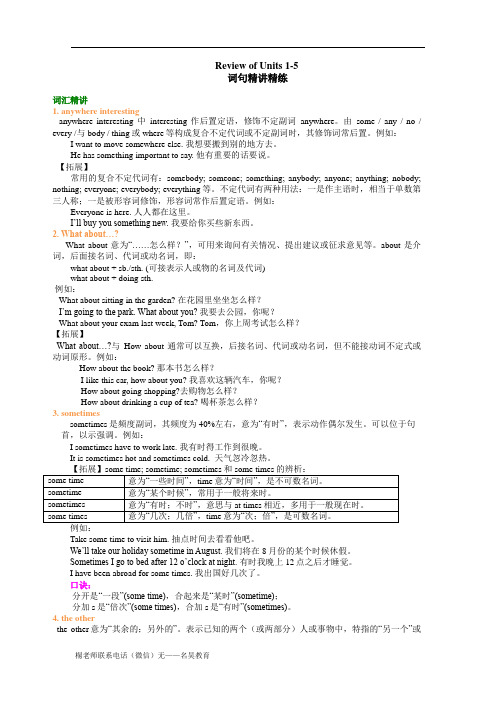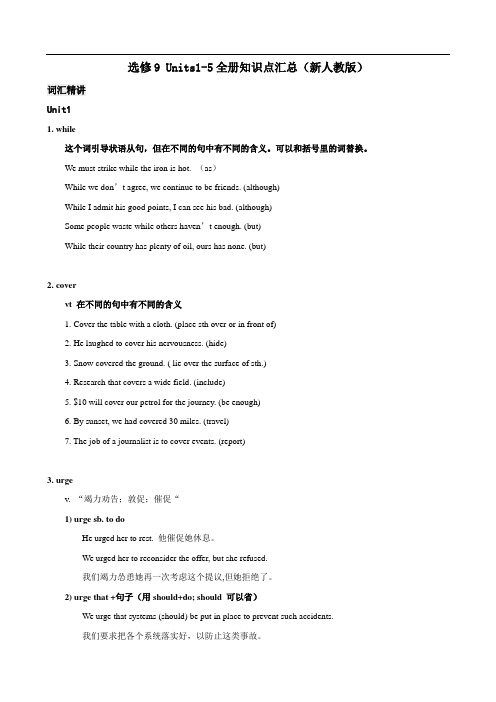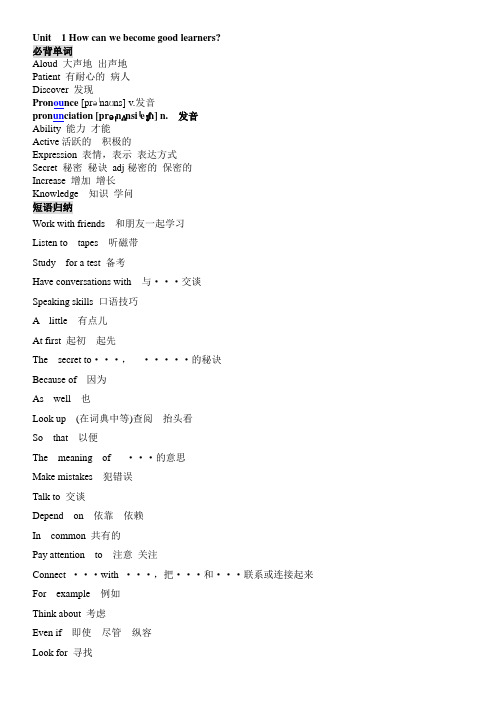初三英语人教版知识导学 Review of Units1—5 (基础知识)1
- 格式:doc
- 大小:81.00 KB
- 文档页数:10

新目标九年级上Review of units 1-5说课稿整理新目标九年级上Review of units 1-5说课稿作为一名教职工,很有必要细心设计一份说课稿,借助说课稿可以有效提升自己的教学力量。
我们应当怎么写说课稿呢?下面是我为大家收集的新目标九年级上Review of units 1-5说课稿,欢迎大家借鉴与参考,盼望对大家有所关心。
一、说教材我今日上课的题目是:Review of units 1-5.这是一节九年级的复习课。
主要复习unit1—unit 5的教学内容。
复习的内容分别为:Unit1 How do you study for a test? Unit2 I used to be afraid of the dark. Unit3 Teenagers should be allowed to choose their own clothes. Unit4 What would you do? Unit5 It must belong to Carla.本节课复习内容齐全,包括听力,单词拼写,阅读训练,翻译训练,单选练习,词形变化等。
二、说重点、难点本节课的`重点内容为词汇和听力。
如---本节课的难点为词形变化。
三、说突破重难点的方法listening for key words and specific informantion,presonalizing , role playing , Brainstoming, reflecting and sequencing.四、说教法本课的Functions是Review the main contents of units 1-5。
Structures为Spelling skills, lisening skills,writing skills。
Target language 主要为—How do you study? —What would you do if you---?—I used to be afraid of the dark. V ocabulary主要包括funny, activities, music, concert, picnic, plate, mystery, appointment, worried, wake, neighbor, garbage等。

Review of Units 1-5词句精讲精练词汇精讲1. anywhere interestinganywhere interesting中interesting作后置定语,修饰不定副词anywhere。
由some / any / no / every /与body / thing或where等构成复合不定代词或不定副词时,其修饰词常后置。
例如:I want to move somewhere else. 我想要搬到别的地方去。
He has something important to say. 他有重要的话要说。
【拓展】常用的复合不定代词有:somebody; someone; something; anybody; anyone; anything; nobody; nothing; everyone; everybody; everything等。
不定代词有两种用法:一是作主语时,相当于单数第三人称;一是被形容词修饰,形容词常作后置定语。
例如:Everyone is here. 人人都在这里。
I’ll buy you something new. 我要给你买些新东西。
2. What about…?What about意为“……怎么样?”,可用来询问有关情况、提出建议或征求意见等。
about是介词,后面接名词、代词或动名词,即:what about + sb./sth. (可接表示人或物的名词及代词)what about + doing sth.例如:What about sitting in the garden? 在花园里坐坐怎么样?I’m going to the park. What about you? 我要去公园,你呢?What about your exam last week, Tom? Tom,你上周考试怎么样?【拓展】What about…?与How about通常可以互换,后接名词、代词或动名词,但不能接动词不定式或动词原形。

选修9 Units1-5全册知识点汇总(新人教版)词汇精讲Unit11. while这个词引导状语从句,但在不同的句中有不同的含义。
可以和括号里的词替换。
We must strike while the iron is hot. (as)While we don’t agree, we continue to be friends. (although)While I admit his good points, I can see his bad. (although)Some people waste while others haven’t enough. (but)While their country has plenty of oil, ours has none. (but)2. covervt 在不同的句中有不同的含义1. Cover the table with a cloth. (place sth over or in front of)2. He laughed to cover his nervousness. (hide)3. Snow covered the ground. ( lie over the surface of sth.)4. Research that covers a wide field. (include)5. $10 will cover our petrol for the journey. (be enough)6. By sunset, we had covered 30 miles. (travel)7. The job of a journalist is to cover events. (report)3. urgev. “竭力劝告;敦促;催促“1) urge sb. to doHe urged her to rest. 他催促她休息。

Unit 1 How can we become good learners?必背单词Aloud 大声地出声地Patient 有耐心的病人Discover 发现Pron ou nce [prəˈnaʊns] v.发音pron un ciation [prəˌnʌnsiˈeɪʃn] n. 发音Ability 能力才能Active活跃的积极的Expression 表情,表示表达方式Secret 秘密秘诀adj秘密的保密的Increase 增加增长Knowledge 知识学问短语归纳Work with friends 和朋友一起学习Listen to tapes 听磁带Study for a test 备考Have conversations with 与···交谈Speaking skills 口语技巧A little 有点儿At first 起初起先The secret to···,·····的秘诀Because of 因为As well 也Look up (在词典中等)查阅抬头看So that 以便The meaning of ···的意思Make mistakes 犯错误Talk to 交谈Depend on 依靠依赖In common 共有的Pay attention to 注意关注Connect ···with ···,把···和···联系或连接起来For example 例如Think about 考虑Even if 即使尽管纵容Look for 寻找Find out 找到查明Worry about 担心担忧Make Word cards 制作单词卡片Ask the teacher for help 向老师求助Read aloud 大声读Spoken English 英语口语Give a report 作报告Word by word 一字一字地So···that 如此···以至于Fall in love with 爱上Something interesting 有趣的事情Take notes 记笔记How often 多久一次A lot of 许多The ability to do sth. 做某事的能力Learning habits 学习习惯Be interested in 对···感兴趣Get bored 感到无聊Be good at 在···方面擅长Be afraid of 害怕Each other 彼此互相Instead of 代替而不是用法集萃By doing sth 通过做某事It +be+adj+to do sth 做某事是···的Finish doing sth 完成某事What about doing sth?做某事怎么样?Try to do sth 尽力做某事The +比较近,the+比较近越···,就越···Find it+adj+to do sth 发现做某事Be afraid of doing sth 害怕做某事Help sb (to) do sth 帮助某人做某事Practice doing sth 练习做某事Keep doing sth 一直做某事Be afraid to do sth 害怕做某事Begin to do sth 开始做某事Want to do sth 想要做某事Need to do sth 需要做某事Remember to do sth 记得做某事Shoot 射(射着,射死等表结果)Shoot at(瞄准)射语法全解一、how询问方式、方法,意为“怎样、如何”。

初三英语Review of Units 1-5(1-5单元复习)知识精讲人教版+汤姆森【同步教育信息】一. 本周教学内容:Review of Units 1-5(1-5单元复习)Hello, everyone. I think you have finished learning Unit 5. And you are facing the mid-term exam. All of you know that it is an important test. Today we will review unit 1-5同学们,大家好。
我想你们已经学完了第五单元,正在面临期中考试,大家都知道这是一次非常重要的考试。
今天我们就来复习一下一至五单元。
归纳总结一. 语法1. 动名词的用法:(1)动名词兼有动词和名词的特征,由动词加-ing构成。
(2)用法A. 作主语She said that memorizing the words of pop songs also helped a lot.B. 作宾语Now, I am enjoying learning English.Thanks for sending me the .C. 作定语I think that doing a lot of listening practice is one of the secrets……2. used to 的用法“主语+used to+动词原形+其它”这个句型结构表示过去的习惯,暗示现在已无此习惯。
used to +dobe+/名形⎧⎨⎩其否定形式是主语+didn’t use to +动原问句形式为:Did+主语+use to+…?反意疑问句:主语+used to+…,did+主语?和used to 相关的其它句型:get / be used to doing 习惯于做…be used for doing被用来3. 简单的被动语态当主语是动作的承受者时,应用被动语态。

Review of units 1-5第一课时:导学案编著:陈元林【学习目标】一)掌握本课时生词的正确发音及拼写:1, net 网,网状物。
2,turn off 关掉。
Turn on 打开3,polar bear 北极熊。
4,Vietnam. 越南。
二)完成2a ,2b 中的听力任务。
三)复习used to 的用法。
四)复习虚拟语气的用法。
五)复习现在完成时态和一般现在时态的用法。
【学习重难点】一)听力练习。
二)虚拟语气的用法。
三)used to 的用法。
四)情态动词的被动语态。
【学习过程】一)预习本课时单词,掌握其正确发音。
二)小组讨论,预习完成1a 的字谜游戏,检查答案。
三)预习完成3,4,5,8中习题。
四)听力训练:完成2a, 2b 中的听力任务。
五)重点导学:(课堂展示)虚拟语气:通常表示对现在,将来或过去情况的一种假设,这种假设通常很难实现。
初中阶段主要了解对现在和将来情况的假设。
结构:If 从句用:动词过去式,(be在任何情况下都用were)主句用:would +动词原形如:If I were you, I would do it at once.如果我是你,我会马上做。
(事实上我不可能是你。
)四)完成下列虚拟语气的有关习题;1,如果你有100万美元,你会怎么办?What _____ you _____ if you _____ a million dollars? 2, 如果他是你,他不会这么做。
If he ____ you, he _______ ____ it like this.3, 如果我知道他的地址,我会马上告诉你。
If I _____ his address, I ______ _____ you at once. 4, 如果你看见了一起交通事故,会怎么办?我会打电话报警。
What ______ you _____ if you ______ a car accident? I ______ ______ the police.五) 用used to 把自己过去的生活习惯,长相,兴趣爱好等与现在做一个对比。
(完整word版)人教版英语九年级1-15单元知识点总结亲爱的读者:本文内容由我和我的同事精心收集整理后编辑发布到文库,发布之前我们对文中内容进行详细的校对,但难免会有错误的地方,如果有错误的地方请您评论区留言,我们予以纠正,如果本文档对您有帮助,请您下载收藏以便随时调用。
下面是本文详细内容。
最后最您生活愉快 ~O(∩_∩)O ~九年级英语Unit11. by + doing通过……方式如:by studying with a groupby 还可以表示:“在…旁”、“靠近”、“在…期间”、“用、”“经过”、“乘……”等如:I live by the river.I have to go back by ten o’clock.The thief entered the room by the window.The student went to park by bus.2. talk about 谈论,议论,讨论如:The students often talk about movieafter class. 学生们常常在课后讨论电影。
talk to sb. === talk with sb. 与某人说话talk to sb. aboutsth 与某人谈论某事3. 提建议的句子:①What/ how about +doing sth.?如:What/ How about going shopping?②Why don’t you + do sth.?如:Why don’t you goshopping?③Why not + do sth. ? 如:Why not go shopping?④Let’s + do sth. 如:Let’s go shopping⑤Shall we/ I + do sth.?如:Shall we/ I go shopping?4. a lot 许多= much 常用于句末如:I eat a lot. 我吃了许多。
Review of Units1—5词句精讲精练撰稿:郭素清审稿:白雪雁【词汇精讲】1.aloudaloud只能作副词使用,意思是“出声地、大声地”,而不能作形容词使用。
The teacher asked us to read the words aloud .老师要求我们大声地读单词。
aloud=in a voice that may be heard / in a loud voice .Your brother cried aloud for help at that time.你弟弟在那个时候大声地喊救命。
2.challenge1)challenge是名词,它的意思是“挑战”,challenge=a call to play a game , have a fight to see who is better。
You must face the challenges when you take part in the games.当你参加这个游戏的时候,你必须面对这些挑战。
2)challenge还可作动词,它的意思是“向……挑战”,challenge=give / send a challenge to somebody.All the boys will challenge you soon .所有的男孩子不久就会向你提出挑战。
3.development1)development作名词,意思是“发展”。
Parents should pay attention to the development of their children.父母应该注意他们孩子的发展。
2)development的动词是develop 相当于“improve”。
Today with the help of computer , the world develops very quickly.当今,在电脑的帮助下世界发展得非常快。
3)development的形容词有developing和developed两个,developing 是“发展”表示正在发展的;developed是“发达”表示已经发展完了。
China is a developing country, Japan is a developed one.中国是一个发展中国家,日本是一个发达的国家。
4.sleepsleep是动词,意思是“睡觉”,是个延续性动词,可以和表示时间段的状语连用。
它的过去式和过去分词都是slept。
They often sleep in the class.他们经常在课堂上睡。
1)go to sleep和get to sleep都是指“睡着、入睡”,go to sleep强调“入睡”的这个动作即begin to sleep;而get to sleep强调进入睡眠状态,经常用于否定句、疑问句和条件句中。
He was so tired that went to sleep. 他很累,不久就睡着了。
2)fall asleep强调是无意识地入睡,是不想睡而睡。
Some fell asleep at the meeting last night.昨天晚上在开会的时候有些人睡觉了。
3)go to bed的意思是“上床睡觉”,它强调上床睡觉的准备动作,没有涉及到是否睡着。
My mother often goes to bed at ten every night.我妈妈经常每天晚上10点上床睡觉。
5.deathdeath作名词,它的意思是“死亡”。
She felt very sad when she thought of his mother’s death.当她想起她妈妈的死时,她很难过。
【拓展】dead ,die ,dying,dieddie是动词,表示死亡,它的过去式和过去分词是died。
The black cat died last night.那只黑色的猫昨天晚上死了。
dead是形容词,dying是现在分词。
Look at the dead fish in that lake.看湖里那些死鱼。
The old man is very ill and I am afraid he is dying.那个老人病得很厉害,恐怕就要死了。
动词die是非延续性动词,在现在完成时表示延续一段时间时,要用形容词dead。
His father has been dead for two years. 他的父亲死了两年了。
6.surprisesurprise是名词,它的意思是“惊奇、惊讶”,构成短语to one’s surprise表示“令人惊奇的是”。
To our surprise, our village changed a lot.令我们惊奇的是我们的村庄变化很多。
【拓展】surprised,surprising这两个单词都是形容词,它们的意思是“惊奇的、惊讶的”。
surprising表示某事或者某物令人惊奇。
surprised表示某人对某事或者某物感到惊奇、惊讶。
The news is very surprising. 那个消息让人惊讶。
We are surprised to see our teacher in Beijing.我们都感到非常惊奇,能在北京见到我们的老师。
7.experience1)experience作名词用,意思是“经验、经历”。
My father has much experience as an engineer.作为一名工程师,我爸爸有丰富的经验。
2)experience作动词,意思是“经历、体验”。
They experienced many difficulties.他们经历了许多困难。
experience意为“经验”时,是不可数名词,作“经历”解是可数名词。
I had some interesting experiences in countryside.我在农村有过有趣的经历。
lion1)million作名词,意思是“百万”。
它用来表示人和事物的数量,修饰可数名词。
My father’s new car is worth two million yuan.我爸爸的新汽车值两百万元。
2)million可以作名词和表示具体数量的数词连用,这时候不用复数形式,也不和of连用。
Your father got five million yuan in the lottery yesterday.你爸爸昨天在彩票抽奖活动中,中奖五百万元。
3)million用来表示“大量的、无数的、数百万的”意思,它的前面不用具体的数词,要用它的复数形式并且和介词of连用。
There are millions of fish in the sea.大海中有数以万计的鱼。
9.permissionpermission是名词,意思是“允许、准许、许可”。
The students can’t enter the teachers’ office without permission.学生未经许可不能进老师的办公室。
【拓展】permission的动词是permit,意思是“允许、许可”。
可以用permit doing 也可以用permit somebody to do…,也可以用于被动语态,和allow是同义词。
His parents permit him to go out and play with his friends.他的父母允许他外出和他的朋友一起玩。
10. happen1)happen的意思是“发生、偶然发生、碰巧”,这个动词没有被动语态的形式。
The accident happened in our school last night.事故昨天发生在我们的学校。
2)happen+to+名词或者代词,表示“碰巧”的意思。
happen to do something的意思是“碰巧做某事”。
It happens that +从句,也可以表示“碰巧做某事”。
It happens that I have seen that program.碰巧我看了那场表演。
We happen to hold the same view.我们两人的想法不谋而合。
11. too muchtoo much表示太多的时候,它的后面用不可数名词。
There is too much water on the road. 路上有太多的水。
【拓展】too many的后面用可数名词的复数形式。
We have too many books on the desk.我们的课桌上有太多的书。
much too是副词短语,意为“非常,太……”,常用来修饰形容词或副词。
The necklace is much too expensive.这条项链太贵了。
euse up意为“用完;耗尽”。
We have used up all the paper.我们把纸全用完了。
By this time he had used up all his savings.到这时, 他的存款已全部用完。
【拓展】use与for或as连用,构成短语use...for,意为“用来做……;为了……而使用”,use...as意为“作为……使用;用作……”。
Bamboo can be used for carrying water.竹子可以用来运水。
The computer can be used as a tool.计算机可以被当作工具用。
【词汇精练】I. 根据所给首字母提示补全单词,完成句子。
1. We have to p_______ these children some food and clothes.2. My English teacher has t_______ many English novels into Chinese.3. My little brother is so i_______ in the movie that he has seen it many times.4. That sad music r______ me of my dead mother.5. Our teacher often r_______ us as her children.6. You should try your best to find a way of s_______ this problem.7. The old woman is really a_______ because she can’t find her money.8. You shouldn’t take your father’s book away without his p_______.9. It h________ that he came to see me that evening.10. Please tell us about your e ________ in Africa.II. 用括号所给单词的适当形式填空。